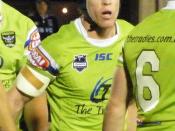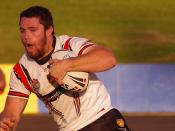In the eyes of many, Peter Shaffer?s ?Equus? can be viewed as a just a perverse, complicated story of a young, psychotic boy. Even so, this play is a tragedy. A tragedy is a literary work in which the main character is brought to ruin. Tragedies can be classified into two sub categories: Aristolian tragedies or ?common man? tragedies. ?Equus? takes on characteristics of both types of tragedies and while it seems to have more characteristics of an Aristolian tragedy, it still holds true to some characteristics of a tragedy of a common man.
There are many significant points needed in which a literary work can be considered a tragedy in an Aristolian sense. Some of these points include having a superior protagonist with a complex and/or an inner conflict and a ?tragic flaw?. There has to be questions of moral order and deep suffering as well as a ?fortunate fall? of the main character.
These are just a few of the characteristics needed to have a work considered an Aristolian tragedy. ?Equus? only has a few of these qualities. In the play there is a protagonist, Alan, even though he is not superior. Alan, has quite a bit of both complex and inner conflict. He is the product of a religious, lenient mother and an atheist, strict father. He has to deal with listening to his mother?s Bible stories as well as his father?s random comments. Alan is a seventeen-year-old male who is not very social and is not very educated in any way. What little he does know he has learned from his mother and the little television he watched at the neighbor?s house. The inner conflict that comes out of this is huge. Alan is a young man who knows virtually nothing about the ?real? world which causes him to have a very vivid imagination which leads to his downfall.
But before Alan?s downfall can be discussed, his ?tragic flaw? must be taken into consideration. Alan?s ?tragic flaw? is his lack of knowledge. Because of his narrow upbringing, his interpretation of what is ethical and socially acceptable, his lack of experience, and his imagination Alan creates his own religion in which his god is a horse. Alan?s god, Equus, is compared to the Christian?s God and this questions moral order. It is not normal or right for someone to worship a horse. Even though Alan?s worship of the horse does question moral order, it is not really considered evil. It is just considered wrong and unusual. In an Aristolian tragedy the questions of moral order have to do with what is evil rather than what is wrong irregular. Alan does not have a ?fortunate downfall? in my opinion. He doesn?t die or anything of that sort. He does blind six horses which does force him to see a psychiatrist as sort of a punishment as well as a way to seek out a ?cure? but I cannot see where there is a ?fortunate downfall? in the story.
Just as ?Equus? can be argued that is may or may not be an Aristolian tragedy, it can also be argued that it may or may not be considered a tragedy of the common man. The biggest thing that helps put ?Equus? in the category of a tragedy of the common man is Alan being a seventeen-year-old protagonist not of supieriority. He is not a king or prince but he is a ?common? boy. According to Miller, in a tragedy, the main character is ?attempting to gain his ?rightful? place in society? and he has a ?tragic flaw? that is not necessarily grand but merely a weakness. Alan is an example of this. He is torn between his religious mother and aethist father. In order for him to feel that he has found his place he creates his own religion. This makes him feel that he has founs where he belongs. His ?tragic flaw? is a weakness. Because Alan is not educated he has a twisted sense of life. Again, he overcomes this by creating his own religion. Because his ?tragic flaw? is only a weakness, Alan has no ?fortunate fall?.
Another point that Miller argues is that the writer of a tragedy has to appreciate cause and effect. This is very true in ?Equus?. Because Alan is the result of conflicting parents, he suffers mentally and emotionally. Because Alan is isolated from other children and is limited to the amount of televsion he can watch, he has a vivid and lively imagination which leads to the creation of his religion and his horse-god, Equus. But just as there are examples in ?Equus? that support Miller?s argument, some of his ideas are not seen in the play. An example of this is when Miller says that ? tragedy requires a nicer balance between what is possible and what is impossible? (p. 173). There really is no such balance in this play. Everything that takes place is possible and really not too unrealistic.
?Equus? is a very complex play. It is definitely a tragedy but to put it on a certain category is a difficult task. There is a protagonist character with a ?tragic flaw? and there is a question of moral order which are some of the characteristics of an Aristolian tragedy. But the play lacks a superior protagonist with a ?fortunate fall?. On the other hand, ?Equus? can be considered a tragedy of the common man because Alan is a ?common? boy who fears his parents and doesn?t know his place in society. So, ?Equus? is both a tragedy of Aristolian sense and a tragedy of the common man but nevertheless it is still a tragedy.




